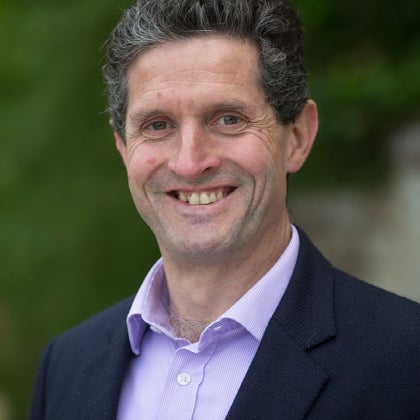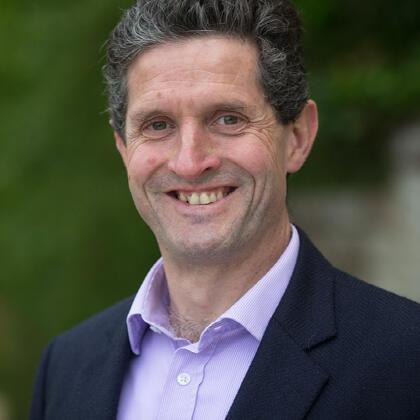Raising the Net Zero Conversation: How to Stop Climate Becoming a Wedge Political Issue
Share
- Details
- Text
- Audio
- Downloads
- Extra Reading
In a year of elections, climate change is emerging as a divisive political issue, in many countries for the first time. We need political debate about climate, but without it becoming an all-or-nothing issue of identity politics. And all sides need to raise their game by not promising we can have our cake and eat it, either costless decarbonisation or costless delay. This lecture argues for “third way” climate solutions, designed explicitly to appeal to the broadest possible coalition.
Download Text
Raising the Net Zero Conversation: How to Stop Climate Becoming a Wedge Political Issue
Professor Myles Allen
1 October 2024
In a particularly poignant episode of “The West Wing”, Josh Lyman gets in a panic over global warming, invites lots of experts in to tell him how to fix it and they spend the meeting rubbishing each other’s solutions, leaving Josh in despair. If only it were fiction.
The latest example of this kind of Hunger Games mentality is a letter from a group of scientists and campaigners urging the Secretary of State to “pause” (yet again) the decision to scale up carbon dioxide capture and storage (CCS) in the U.K.
Reactions from CCS experts have focussed on the letter’s claim that CCS is somehow unproven or unsafe: it isn’t. The Norwegians have been pumping carbon dioxide into the Utsira sandstone deep beneath the Sleipner platform for over a quarter of a century, where it has remained, diffusing through the sandstone and trapped by the caprock, exactly as designed. Intervening mudstone layers dispersed it faster than expected, which probably reduced the overall risk of leakage, it any. But even this response misses the bigger picture, because it gives credence to the idea that any risk that a miniscule fraction of that stored carbon dioxide might leak out after a couple of centuries is relevant to the question of whether it was a good idea to put it there in the first place.
The world is going to generate more carbon dioxide by burning fossil fuels than can safely be dumped into the atmosphere, even under the most optimistic assumptions about what might be taken up by our increasingly over-stressed forests and oceans. Anyone who suggests otherwise is in denial, given we may well have exhausted the carbon budget for 1.5°C already. To meet our climate goals, we will likely have to dispose, permanently, of hundreds of billions of tonnes of carbon dioxide over the course of this century. And the only known way to do this is geological storage, CCS. Of course, there will be challenges: leaks will have to be fixed, and the carbon dioxide recaptured. But these make the job of scaling up safe carbon dioxide disposal harder. They don’t make it optional.
Fortunately, an increasing number of countries are belatedly coming round to realising this. The only real question is whether the U.K., with all the resources, expertise and geology to play a leading role, is going to join in or simply tap out and leave it to others.
Even the letter’s authors acknowledge that CCS “may” be needed in a net zero economy (everyone, from our own Climate Change Committee to the International Energy Agency, IEA, knows it will be). So, why are they so keen to block it? True, the letter is only calling for a “pause”, but the authors know that another last-minute snafu would almost certainly be terminal, after the debacles of 2011 and 2015, when the governments of the day pulled the plug on “world-leading” CCS projects after industry had already sunk tens of millions of pounds into them. Investors would give up on the U.K. altogether, and the global outlook for investment in CCS would take years to recover.
Why would anyone concerned about the climate issue want this outcome? The answer perhaps lies towards the end of the letter, where the authors urge the Secretary of State to redirect the £1 billion of state support earmarked for these initial CCS projects to renewable energy and demand reduction measures. It’s not just about the £1 billion. If you support renewable energy and demand reduction, then taking CCS out of the picture improves the outlook for both: as any tech titan will tell you, if you take out the competition, your own product becomes more indispensable and hence more valuable in the long term.
In the very long term, that is. In the short term, CCS may well be essential to manage intermittency in the electricity grid, making renewable energy more, not less, profitable. This could be either through CCS fitted directly on gas-fired power stations, as recommended by the IEA, or for the production of blue hydrogen for storage until green hydrogen is available on the necessary scale. The alternative, of course, is gas without CCS, meaning failure to decarbonise the grid.
The point the letter’s authors raise about methane emissions associated with LNG production is entirely fair – much of the industry is outrageously sloppy. But the solution is better regulation, and penalising imports from high-emission sources. As we reduce our natural gas imports, LNG should be the first to go. But gas will continue to be used somewhere in the world well past 2050 – on that all scenarios agree. Far better for the UK to set an example of good practice than simply opt out.
The trauma of the past couple of years has left everyone concerned about any reliance on imported fossil energy, but in the event, the international gas industry proved surprisingly resilient. Who would have predicted Germany would have three LNG terminals up and running in six months? The main lesson to draw from 2022 is the danger of over-reliance on any single energy source. Recent studies have argued that a retreat into energy nationalism will make global climate action harder.
Developing a durable carbon dioxide disposal industry is going to be hard enough anyway, potentially much harder than the relatively easy emission reductions we have made so far. But having levied many tens of billions of pounds in taxes from the extraction of fossil carbon from the North Sea, one billion seems a not-unreasonable contribution from the public purse to kick-start our contribution, although other ways of funding it will need to be found in future.
That said, Rachel Reeves may well be concerned about the optics of handing over £1 billion for a programme that won’t have any discernible impact on climate for decades, having just saved a similar amount by cancelling this year’s winter fuel payment. So why not fund it instead with a levy on all fossil fuel produced in or imported into the UK, exactly as Ron Oxburgh proposed in 2015, or Chris Skidmore in his “Mission Zero” review in 2022?
After all, as critics of CCS are quick to point out, apart from our grandchildren, the main beneficiaries of a successful CCS roll-out are the fossil fuel industry and its customers. So, require them to pay for it, as the European Union has done in its Net Zero Industry Act. Even if the industry manages to pass the entire cost on to customers, £1 billion over three years would amount to an additional carbon price of a mere £1 per tonne of CO2, much less than the carbon floor price, or less than ¼ of a penny per litre of petrol. And that way, no one can complain that CCS is depriving renewable energy of any of its subsidies.
As the first country to extract fossil carbon out of the Earth’s crust on an industrial scale, the U.K. has a historic responsibility to pioneer putting it back, notwithstanding the opportunity to develop a lucrative carbon dioxide disposal business. Suggesting we should leave that job to others and stick to home insulation is irresponsible.
© Professor Myles Allen 2024
Part of:
This event was on Tue, 01 Oct 2024
Support Gresham
Gresham College has offered an outstanding education to the public free of charge for over 400 years. Today, Gresham College plays an important role in fostering a love of learning and a greater understanding of ourselves and the world around us. Your donation will help to widen our reach and to broaden our audience, allowing more people to benefit from a high-quality education from some of the brightest minds.


 Login
Login







